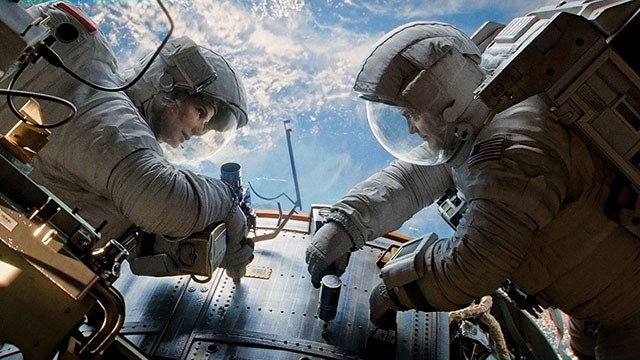Gravity
★★★★ (out of 5 stars)
The hype is mostly justified. Alfonso Cuarón’s Gravity may not have any profound statements to make about the will to survive, and its character development may be distractingly sentimental, but as a cinematic experience it’s hard to beat. In fact, it may be the most thrilling, transporting and unbearably stressful 90 minutes in the theater you’ve ever experienced.
Opening with a stunning 15-minute shot, we’re introduced to astronauts Matt Kowalski (George Clooney) and Dr. Ryan Stone (Sandra Bullock), floating 600,000 feet above the Earth as they repair the Hubble Telescope. Kowalski is a retirement-bound veteran shuttle pilot who regales his colleagues with tales of past exploits while scooting around on his jetpack, playing country-western tunes. Stone is the nervous rookie, overseeing the telescope’s data upgrade. Clumsy in her unwieldy spacesuit and struggling to hold down her last meal, she tries to tune out Kowalski’s incessant banter and focus on the task at hand - no easy job given that the full grandeur of Earth as seen from space offers a sweeping, breathtaking spacescape.
It’s a lighthearted, joyously banal sequence that establishes the workaday rapport that exists between the crew. For us, on Earth, it’s a rare and spectacularly mesmerizing glimpse into the world of orbital travel. For them, it’s another day at the office.
That breezy, placid mood is suddenly shattered as mission control reports the detonation of a Russian satellite half a world away. Debris is bearing down on Hubble, traveling at thousands of miles per hour. From this moment on, Gravity becomes an extravagantly conceived and brutally intense disaster movie where the audience is immersed in the lyrical magnificence and dizzying terror of outer space.
The film’s chain reactions of destruction and zero-g catastrophe are as stunning to watch as they are harrowing to experience. Cuarón luxuriates in virtuoso long takes that capture the infinite loneliness of the void and the low-oxygen claustrophobic helplessness of watching as shrapnel-like piece of machinery fly toward Bullock’s face. This is what 3-D was made for. Gravity’s optical wonderland not only sends objects off the screen and within our reach, but heightens the physical distances that lay between astronaut and salvation, increasing both the stakes and our heart rates. It also allows Cuarón to indulge in moments of three-dimensional poetry, as when Bullock’s tears gently float away from the screen. These moments are far more effective than his labored visual metaphors of rebirth.
Gravity’s sound design is equally revelatory, magnifying Bullock’s desperate and terror-filled gasps for air then taking us into the dread silence of sound-deadening space. Steve Price’s bass-heavy score is the perfect match, complementing the action with its heart-thrumming rhythms.
This is lean, mean plotting at its best. Streamlined and taut, Cuarón (who penned the script with his son Jonás) expertly doles out brief moments of calm before the next unpredictable calamity strikes.
Bullock, who is front and center for most of the movie, delivers the emotional and physical goods as a woman who has nothing to live for fighting to survive. Saddled with a maudlin dead-child back story, she sells the script’s hokier moments in an impressively restrained performance. It’s all the more impressive when you consider that it’s essentially a one-woman show played against an empty green-screen.
Clooney’s calmly sarcastic and self-deprecating commander, on the other hand, plays directly into the actor’s laid-back charms. He’s amusing and reassuring in equal doses – exactly the guy you want yapping in your ear piece as you float helplessly through space.
As an instance of populist filmmaking, Gravity is as good as it gets; teeth-clenchingly intense and gloriously immersive. But as an instance of art, the conventionality of its spiritual aspirations deny it of true classic status (The Life Of Pi had similar shortcomings). Nevertheless, I defy anyone to deny the gut-wrenching impact of its weightless action sequences or the visceral profundity of its earthbound final moments. Cuarón demonstrates that cellphone screens and tricked out home theaters are no match for his big screen artistry.


